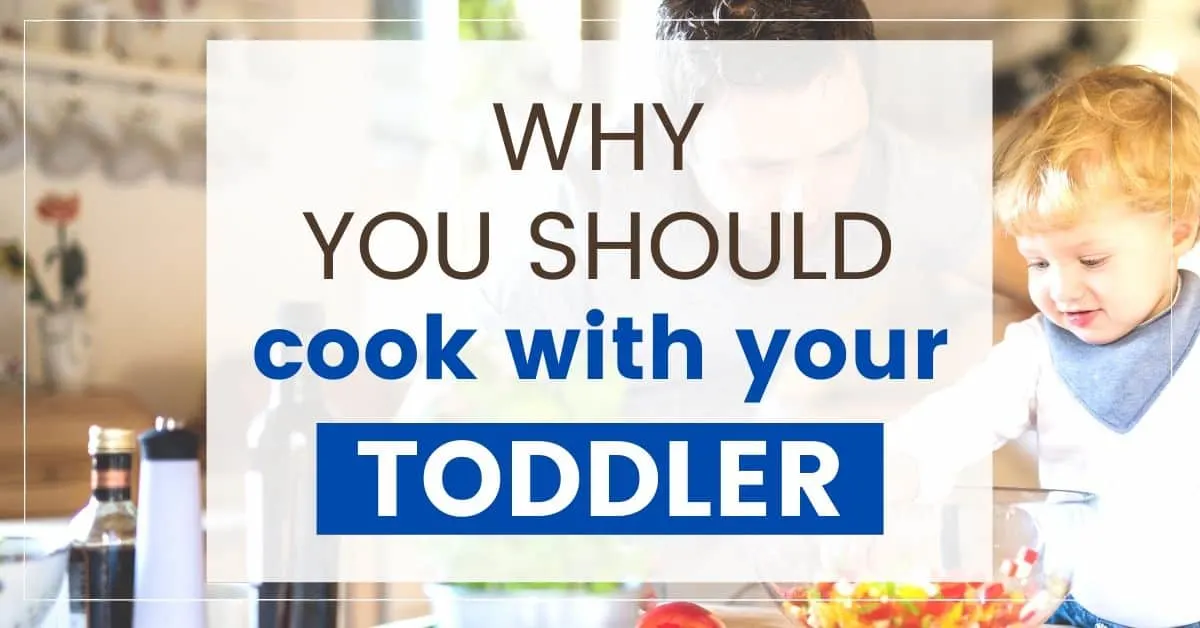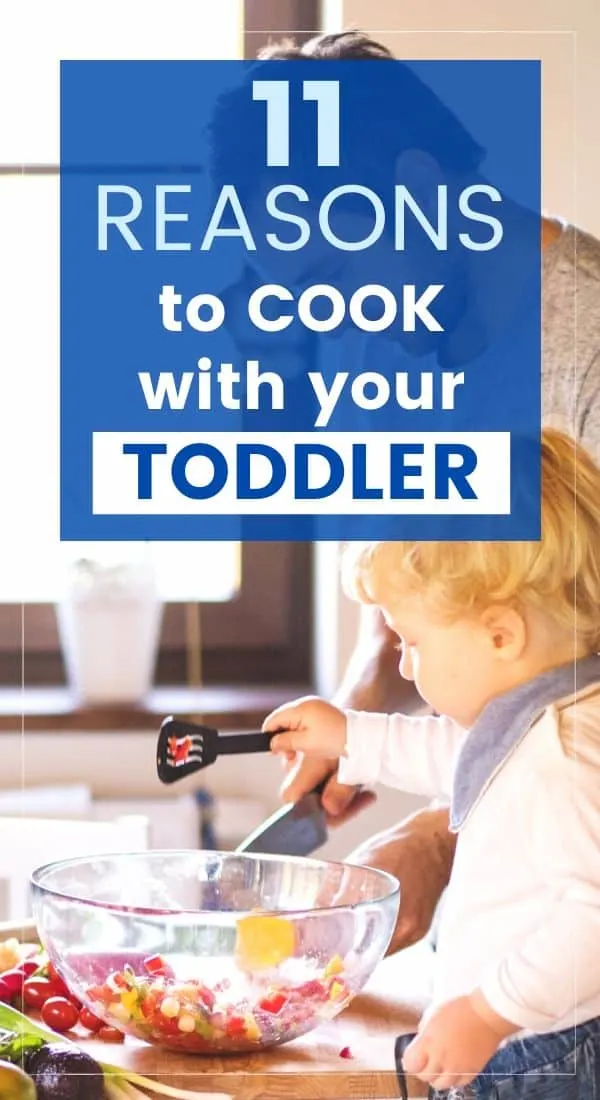Cooking with toddlers has to many benefits and helps them learn and grow. Here are 11 reasons you should cook with your toddler!

This post contains affiliate links. As an Amazon associate, I earn from qualifying purchases. See my disclosure.
There are so many reasons you should get your child involved in the kitchen as early as possible
Toddlers as young as ~18 months can start "helping" in the kitchen. Around age 2.5 - 3 years old they can actually do a few tasks in the kitchen and start being actually helpful. The more time you spend with your toddler in the kitchen, the more they will learn and will be able to help you.
If your child is not super into it (yet), here are 10 Ways to Get Toddler Interested in Helping You Cook.
Here's my challenge to you: Read this list below, then commit to cooking with your child at least once a week for 2 months. Start with your favorite easy recipes, or try a monthly subscription made especially for kids, such as Raddish Kids. See if it makes a difference in your child's pickiness, confidence, patience, and ability to follow directions. You might be surprised!
Here are all the reasons I try to cook with my toddler every day.
1. Reduce picky eating and learn to eat "real" food
I'll start with the biggest reason I cook with my toddler: to help reduce his picky eating and to get him trying lots of new foods.
If you're new here, this blog is about how we are overcoming picky eating with my now three year old son. If you're curious to read more about that, learn about it here.
Here is how cooking with toddlers helps reduce picky eating:
- It gets kids exposed to new foods and ingredients in a safe, no-pressure environment where they don't have to eat
- It helps kids see what goes into their food, helping them know what to expect when the food appears on their plate at dinner time
- It gets kids touching the food, helping them know what to expect from the texture
- Talking about food and ingredients and their textures also helps kids describe foods in words other than "yum" and "yuck" (more on this below!)
As children cook and see the food being prepared, they are a lot more likely to try that food and start eating more real, healthy, whole foods instead of just snacks.
2. Sensory activity
Cooking with toddlers is one of the easiest way to do sensory activities with them! Getting them to help in the kitchen gets their hands messy and sticky and touching lots of textures without having to set up elaborate sensory bins.
Sensory activities are super important for overcoming picky eating, and I write about how our feeding therapist started each feeding therapy session with a sensory activity. I love our feeding therapist and she has helped us make huge progress (read about our experience with feeding therapy for picky eating), but I realized I can easily do sensory activities with my son at home to supplement the therapy!
In fact, that's why I came up with 52 Weeks of Sensory - it's a year's worth of easy sensory activities to do with toddlers, and many of them revolve around food, being in the kitchen, and cooking together. It's my commitment to do sensory activities with my son for a whole year, and we have seen such huge progress with his eating over the last few months thanks to this!
3. Motor skills
Cooking with toddlers give them a chance to practice lots of fine motor skills:
- Measuring
- Pouring
- Mixing
- Cutting (using a toddler-safe knife, such as a toddler knife)
- Whisking
- Mashing
- Rolling
- Patting
- Opening containers and zip lock bags
- Rolling out parchment paper / foil
If you've ever cooked with a toddler, you will be shocked to see how awful they are at these things at first... and that's OK!
Have patience, show your child how to do these things, let them practice, let them make a mess. Of course, you can guide them if you are low on patience or time, or do it yourself when you need to, and talk to them about how and why you are doing these things so they understand when to whisk slowly, or why sometimes you use a fork to mix and sometimes you use a spatula.
4. Cognitive growth and development
As I touched upon in the last paragraph, there is SO MUCH TO LEARN when you are cooking!
Talk to your child about everything you're doing in the kitchen, and walk them through every decision you make as you cook:
- When to choose the big bowl or the small bowl
- Why you're using a big skillet
- When to use a pan vs a pot
- Why you mix dry ingredients separate from the wet ingredients for pancakes
- Teach them about different appliances (microwave for reheating / thawing food, stand mixer for baking, etc.)
- Why you need 2 slices of bread per sandwich
- When to wash their hands
- How to clean up spills
Having toddlers learn how to do things is just as important as understanding why they have to do things, and cooking together is a great way to learn many important life skills!
5. Following directions
Walking your toddler through recipe directions is a great way to show them how important it is to follow directions. And on top of that, having them in the kitchen with you will teach them how important it is to follow your directions as well - the directions not mentioned in the recipes, such as cleaning up, kitchen safety, and others.
Of course, this won't happen immediately. It might be a slow and often frustrating process, but it will click eventually if you always make the effort to walk your little one through what you're doing and why, and explain to them your expectations about following your directions.
6. Math skills
Cooking with toddlers can help them with basic math skills. Here are some ideas for how to teach math to toddlers while cooking:
- Ask them for "help" with reading the numbers in recipes
- Have them count our the number of cups / spoons of ingredients
- Show them that it takes 4 quarter cups to fill 1 cup, or 3 teaspoons to make 1 tablespoon
- If you're making anything like meatballs, nuggets, empanadas, you can count the number of things you're cooking
- Talk about how many sandwiches you need to make for the family, and how you need twice as many pieces of bread
- Show them how to divide and cut things in half, teach them the basics of ratios
- Teach them shapes - circle pizza or pie dish, triangle slices of pizza, rectangular sheet pan, straight line of celery, oranges are spheres, etc
7. Increase their vocabulary
Explaining what you're doing as you cook helps increase your child's vocabulary. Obviously, they'll learn lots of kitchen-related words, such as ingredients, tools, equipment.
As you cook, take time to talk about how the food feels, tastes, and smells: sweet, sour, salty, spicy, flowery, slimy, soft, squishy, cold, warm, tepid, hot, aromatic, pungent, crunchy, crispy, juicy, etc. So many ways to describe food other than "yummy" and "yucky!"
In addition to those words, they'll also learn the meaning of important verbs they might not learn elsewhere at such a young age, such as: rinse, seal, cut, slice, dice, chop, mix, add, spread, season, label, unroll, etc.
8. Learning to cook - an important life skill
I mention cooking in my post about life skills to teach your toddler. The sooner your child learns basic kitchen skills, the sooner they'll be able to make themselves an easy snack or lunch.
Wouldn't it be amazing if instead of whining about being hungry or wanting a snack, your future 8 year old asked if they could make themselves a sandwich, and you knew you could trust them to do it on their own and not make a big mess in the kitchen?
Learning how to make basic things, such as sandwiches, putting together quesadillas, or making a smoothie will make them self-sufficient in the kitchen in just a few years!
9. Boost toddlers' creativity
Cooking with children can help boost their creativity as they think of fun new things to add to their "recipes," as you show them different ways to present foods on a plate, or different ways to cut up food.
Kids can help decorate cupcakes, choose frosting colors, choose ingredients for their smoothies or omelettes - you get the idea! There are so many ways to be creative in the kitchen.
Just check out this monster popcorn recipe and see how creative your kids can get!
1o. Build their confidence
As your kids get to be creative in the kitchen and learn how to do a few things on their own, this will help boost their confidence!
11. Keep toddlers busy
Aside from all the benefits about cooking with children, it's just a simple way to keep toddlers busy and within your sight as you have to prep dinner.
Think about how often you've tried to make dinner as your kid is asking you to play with him or her or whining from the living room, or worse.... absolutely silent, so you know he or she is up to no good.
Having your toddler in the kitchen with you is an easy to way to keep an eye on them while making dinner and having them learn in the process.
For me, it's easier to spend a little extra time making dinner and cleaning up than spending 40 minutes playing with him and then trying to cook dinner as quickly as possible while he whines for me to continue playing with him.
As I mentioned before, if your child is not super into helping you cook, here are 10 ideas to get toddlers interested in cooking.
I hope these reasons to cook with your child inspire you to start cooking together!
Here's my challenge to you: commit to cooking with your child at least once a week for 2 months. Start with your favorite easy recipes, or try a monthly subscription made especially for kids, such as Raddish Kids. See if it makes a difference in your child's pickiness, confidence, patience, and ability to follow directions. You might be surprised! And then come back here and let me know in a comment how it's going. 🙂
Easy recipes to cook with toddlers:
- Taco pinwheels
- Mini broccoli quesadillas
- Mini chicken quesadillas
- Mashed potato nuggets
- 3 Ingredient tuna salad
- Hawaiian chicken salad with pineapple
- Jello with fruit from juice
- Monster popcorn
Looking for other resources for picky eating?
- How to get a toddler to eat when they refuse
- Distraction feeding
- Division of responsibilities in feeding
- Feeding therapy for picky eating
- How to get a picky toddler to eat meat
Was this post helpful? Share it with a friend and save it for later on Pinterest!



